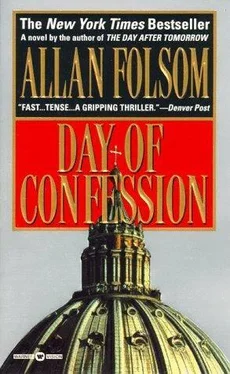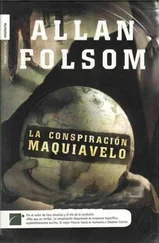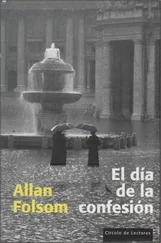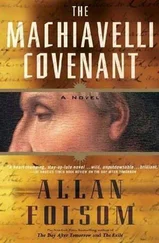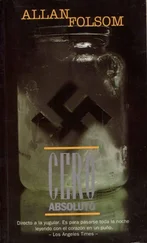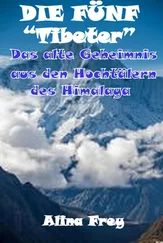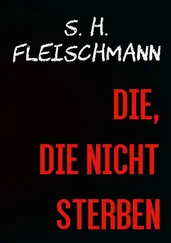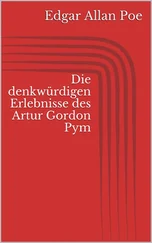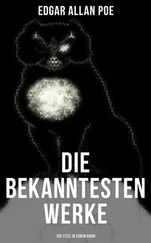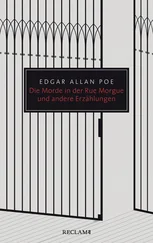'Wise ass.' Danny grinned at him as darkness enveloped the car and they were safely away.
'Just because I waved the guy a thanks?'
'Yeah, just because you waved the guy a thanks.' Danny glanced back at Elena and smiled again. 'What if he hadn't liked it and decided to pull us over? Then what?'
Harry looked over. 'Then you could have explained to him what the hell was going on and why we had to get to Rome. Maybe he would have even sent the army with us…'
'The army wouldn't go into the Vatican, Harry… Not the Italian Army, not any army…'
'No, just you… and Father Bardoni…' Harry's voice had a decided edge.
Danny nodded. 'Just me and Father Bardoni.'
Rome. The Church of San Crisogno, Trastevere section. Thursday, July 16, 5:30 a.m.
Palestrina stepped from the back of the Mercedes and into the mist of early-morning light. Glancing around protectively at the deserted street, one of Farel's black-suited men moved ahead of him, crossing the sidewalk to open the door to the eighteenth-century church. Then he stepped back, and the Vatican secretariat of state entered alone.
Palestrina's footsteps echoed as he approached the altar and then, crossing himself, knelt to pray beside the only other person there – a woman in black, a rosary in her hand.
'It has been a long time since my last confession, Father,' she said without looking at him. 'Could I confess to you?'
'Of course.' Palestrina crossed himself again and stood. And then he and Thomas Kind walked away toward the dark singularity of the confessional.
Lugano, Switzerland. The house at Via Monte Ceneri, 87. Still Thursday, July 16. Same time. A clear morning after the rain.
Roscani walked down the steps and back into the street. His suit was more than wrinkled, he had a stubble beard, and he was tired. Almost too tired to think the way he needed to think. But more than that, he was angry and tired of being lied to, especially by women who, on the outside at least, should have been respectable. Mother Fenti for one, and, here in Lugano, the sculptor and painter Signora Veronique Vaccaro, an iconoclast in middle age who swore she knew nothing of the fugitives and refused to waver from her story.
Roscani had been picked up at the Lugano police helipad by the chief investigator who had first interviewed Veronique Vaccaro; and he had gone over the entire report of his interrogation and his staff's findings as they carried out the warrant search. They had found nothing to indicate the house had been occupied during Signora Vaccaro's short absence. However, neighbors had reported seeing a white van with lettering on the doors parked in front of the entrance for a short time at midday the day before. And two young boys taking their dog for a walk in the rain after dinner that night had said they'd seen a big car, a Mercedes, the older boy proudly swore, parked in front as they'd left their house. But it had not been there when they'd come back. And Signora Vaccaro's alibi, one impossible to corroborate, was that she had come home only moments before the police arrived, returning from a camping/sketching trip alone in the Alps.
It was no better with Castelletti and Scala, who had closed the investigations in Bellagio with the interrogation of Monsignor Jean-Bernard Dalbouse, French-born parish priest of the Church of Santa Chiara, and his staff, clerical and laypeople alike. The end result of exhaustive questioning was that each and every one denied having received a call from a cell phone in Siena at 4:20 A.M. the day before. A cell phone registered to Mother Fenti.
Liars. They were all liars.
Why?
It was driving Roscani crazy. Every one of them risked going to jail and for a long time. Yet none of them had even begun to crack. Who, or what, were they protecting?
Leaving Veronique's house, Roscani walked the street alone. The neighborhood was quiet, its residents still asleep. Lake Lugano stretching in the distance was also still, glassed over, from this distance not even a ripple. What was he doing out there? Looking for clues the others had missed? Once again becoming the bulldog of his father's legacy? Going in circles until he had some kind of answer? Or, did he have a sense that this was where he should be? Like some kind of magnet drawn toward a pile of sawdust and a lost nail. Throwing off the notion, telling himself he was out there for the fresh air, for a moment of assoluta tranquillita, he pulled a battered cigarette pack from his jacket, once again twisted an unlit cigarette into the corner of his mouth, and turned back for the house.
Five paces later he saw it. It was on the edge of the road, under an overhanging bush that kept last night's rain from soaking it through. A flat manila envelope with the impression of a tire tread on it.
Tossing away his cigarette, Roscani bent over and picked it up. More ragged than it had first appeared, it looked as if a wet tire had run over it, caught it up and turned it several revolutions before speed had thrown it off. There was an impression in its surface, as if something stiff and hard had once been inside.
Going back to the house, Roscani went inside and found Veronique Vaccaro – still incensed from her interrogation and the continued presence of the police – sitting in her kitchen in a bathrobe, one hand around a cup of coffee, the other drumming fingers on the table as if that in itself would make the authorities leave once and for all. Politely he asked for a hair dryer.
'It's in the bathroom,' she said in Italian. 'Why not use the bath, too, and take a nap in my bed.'
With a half smile at Castelletti as he passed him, Roscani went into Veronique's bathroom, took down the hair dryer and played it over the envelope until it dried.
Castelletti came in and stood behind him, watching as Roscani smoothed the envelope on the edge of the sink, and pushed a pencil back and forth across it, as one might do in the creation of a rubbing. Little by little the image of what had been inside appeared.
'Jesus Christ.' Suddenly Roscani stopped.
Raised on the envelope in front of them were the highly select letters and number of a diplomatic license plate.
SCV 13
'Vatican City,' Castelletti said.
'Yeah,' Roscani looked at him. 'Vatican City.'
Rome.
It was just before five in the morning and still dark when Danny signaled Harry to stop in front of Via Nicolo V, 22, an old, well-kept three-story apartment complex on a tree-lined street. Locking the Mercedes, Harry and Elena took Danny in his wheelchair up the small elevator to the top floor, where Danny took a set of keys from an envelope Father Bardoni had given him in Lugano. Choosing one, he opened the door to Piano 3a, a spacious rear apartment.
Once they were inside, Danny, visibly wearied from the long drive, had gone to bed. Then Harry, taking brief stock of the surroundings and warning Elena to let no one in but himself, left.
Following Danny's instructions, he drove the Mercedes to a street several blocks away, where he removed the Vatican City license plates and replaced them with the original ones. Then, locking the keys inside, he walked off, the Vatican plates hidden inside his jacket. Fifteen minutes later, he was back at number 22 Via Nicolo V, taking the elevator up to the apartment. It was almost six o'clock in the morning, little more than half an hour before Father Bardoni was to meet them there.
Harry liked none of it. The idea that Danny, in his condition, and Father Bardoni could succeed in freeing Marsciano from wherever he was being held inside the Vatican was insane. But Danny was determined and so, evidently, was Father Bardoni. What that meant to Harry was one thing alone: Danny would try and Danny would be killed – which was obviously Palestrina's plan.
Читать дальше
